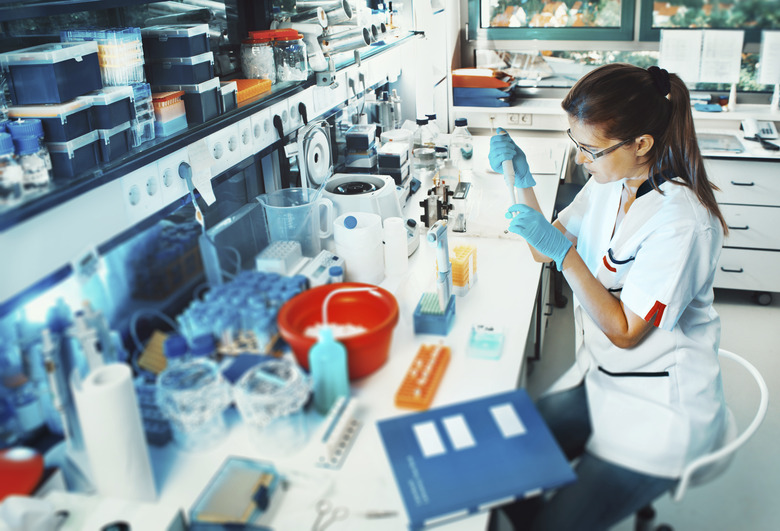Advantages & Disadvantages Of Cloning
Scientists around the world continue to argue the advantages of cloning in hopes of being able to research it more thoroughly, but more than 30 countries have already issued bans on human reproductive cloning. However, the countries of China, Sweden, England, Israel and Singapore do allow cloning for reasons that have nothing to do with human reproduction.
TL;DR (Too Long; Didn't Read)
Some of the pros of cloning include recreating livestock, deceased pets and bringing extinct species back to life, but arguments against cloning mostly focus on human cloning for reproductive purposes.
The Pros of Cloning
The Pros of Cloning
Benefits of cloning include being able to create tissue and organs that doctors can use when needed for surgery on the original. If labs can clone and grow only the parts needed, this would eliminate the moral and ethical issues associated with cloning an entire person. Other benefits include growing stem cells, cloning lab mice genetically engineered for the specific study, bringing back extinct species, reproducing a pet that died and cloning livestock for food.
The Cons of Cloning
The Cons of Cloning
One of the main drawbacks of cloning is that if the original organism has genetic defects, these transfer to the clone as a copy of the original. The first clone, Dolly the sheep, born to a surrogate in 1996, was a genetic copy of a six-year old sheep. Dolly only lived to six years old herself, the bottom end of a sheep's average life expectancy. At the age of five she developed arthritis, and the researchers put her to sleep at age six because of tumors in her lungs, which may have been in the genome of the original.
Genetic Engineering and Cloning
Genetic Engineering and Cloning
By April 2003, scientists finished mapping the human genome, but other scientists had already developed ways to edit them before that time. After discovering how the CRISPR Cas9 system might work as a genome-editing tool in 2012, scientists used this system as a tool to snip bad genes from genetic material. While this is helpful for curing people of potentially deadly diseases, it also could lead to the development of designer humans. (CRISPR itself has encountered resistance after a couple of studies linked CRISPR-edited cells to an increased risk of cancer.) This creates an argument on moral and ethical grounds, because only rich people could do this, creating multiple disadvantages in society.
Moral and Ethical Arguments of Cloning
Moral and Ethical Arguments of Cloning
The moral and ethical arguments of cloning mostly refer to human cloning and human reproductive cloning. One of the problems of creating a cloned copy of a human being is that it creates a moral and ethical dilemma. Since the original and the copy are both human beings, but separate, like identical twins (nature's version of cloning), this means that the clone has the same rights as the original and it would be illegal to use the clone's parts or organs for replacement in the original. Some researchers argue that the cloning a child using the genetic material of the donor imposes an unfair situation upon the clone, as the clone has lost the right to have its own genetic material because the original forced its genes onto the clone.
References
- University of Utah: Why Clone
- The University of Edinburgh: The Life of Dolly
- National Human Genome Research Institute: An Overview of the Human Genome Project
- Stanford University: Target, Delete, Repair
- Broad Institute: CRISPR Timeline
- Scientific American: CRISPR-Edited Cells Linked to Cancer Risk in 2 Studies
Cite This Article
MLA
Brenner, Laurie. "Advantages & Disadvantages Of Cloning" sciencing.com, https://www.sciencing.com/advantages-disadvantages-cloning-4620621/. 27 July 2018.
APA
Brenner, Laurie. (2018, July 27). Advantages & Disadvantages Of Cloning. sciencing.com. Retrieved from https://www.sciencing.com/advantages-disadvantages-cloning-4620621/
Chicago
Brenner, Laurie. Advantages & Disadvantages Of Cloning last modified August 30, 2022. https://www.sciencing.com/advantages-disadvantages-cloning-4620621/
